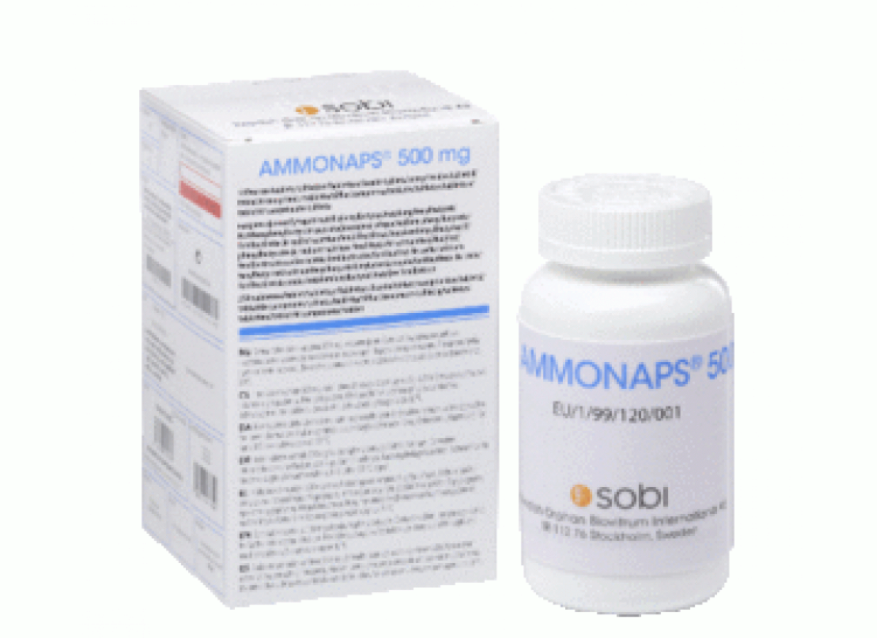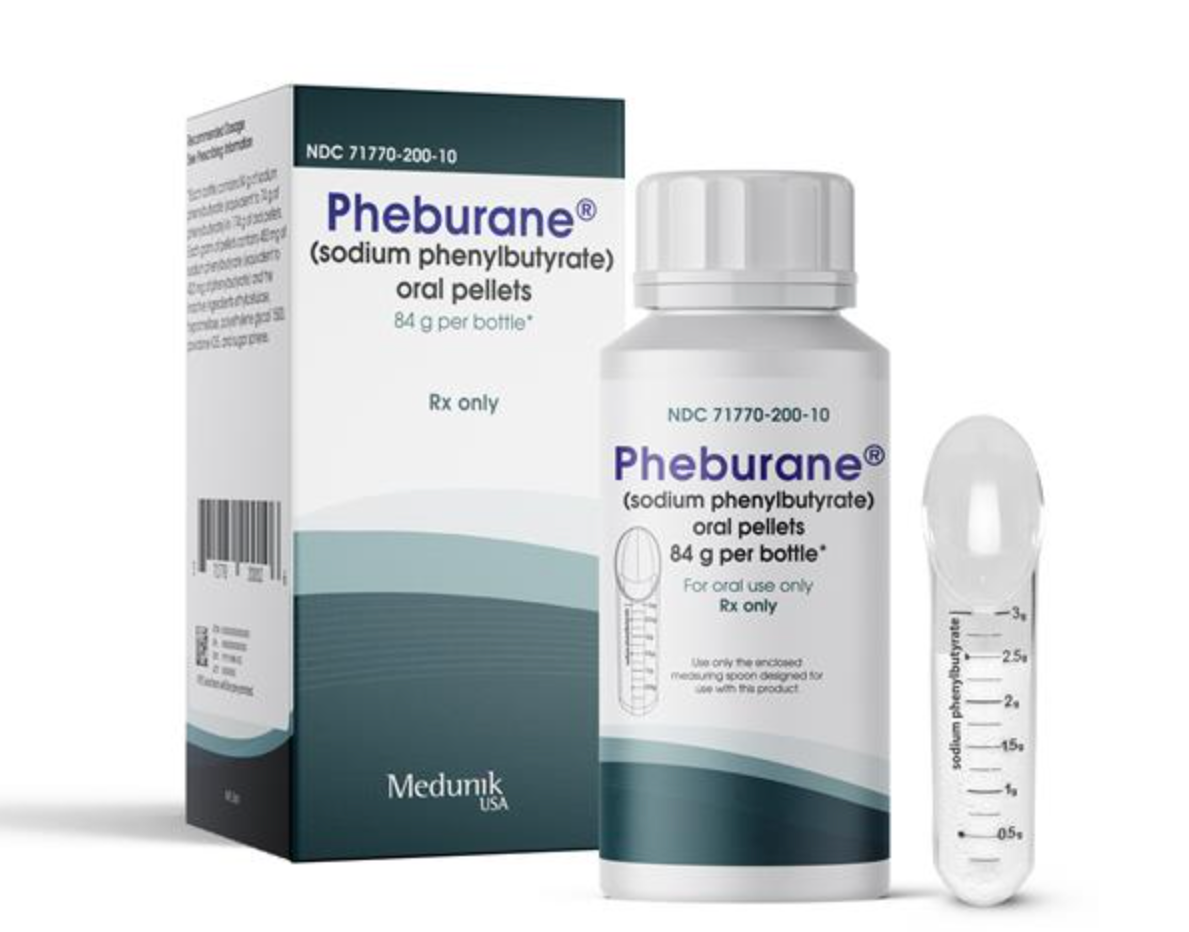Ammonaps (sodium phenylbutyrate) vs Pheburane (sodium phenylbutyrate)
Ammonaps (sodium phenylbutyrate) vs Pheburane (sodium phenylbutyrate)
Ammonaps and Pheburane both contain the active ingredient sodium phenylbutyrate and are used to treat urea cycle disorders by helping to remove excess ammonia from the blood. Ammonaps is available in tablet and powder form, while Pheburane is a specially formulated microgranule product with a taste-masked coating, potentially improving palatability and adherence, especially in children. When deciding between the two, patients should consider factors such as ease of administration, taste preference, and the formulation that best fits their lifestyle and ability to consistently take the medication as prescribed.
Difference between Ammonaps and Pheburane
| Metric | Ammonaps (sodium phenylbutyrate) | Pheburane (sodium phenylbutyrate) |
|---|---|---|
| Generic name | Sodium phenylbutyrate | Sodium phenylbutyrate |
| Indications | Urea cycle disorders | Urea cycle disorders |
| Mechanism of action | Converts to phenylacetate which conjugates with glutamine to form phenylacetylglutamine, which is excreted by the kidneys | Converts to phenylacetate which conjugates with glutamine to form phenylacetylglutamine, which is excreted by the kidneys |
| Brand names | Ammonaps | Pheburane |
| Administrative route | Oral | Oral |
| Side effects | Menstrual abnormalities, amenorrhea, decreased appetite, body odor, nausea, vomiting, fatigue | Taste aversion, nausea, vomiting, headache, somnolence |
| Contraindications | Hypersensitivity to sodium phenylbutyrate or its excipients | Hypersensitivity to sodium phenylbutyrate or its excipients |
| Drug class | Urea cycle disorder agent | Urea cycle disorder agent |
| Manufacturer | Swedish Orphan Biovitrum | Laboratoires Lucane Pharma |
Efficacy
Efficacy of Sodium Phenylbutyrate in Amyotrophic Lateral Sclerosis (ALS)
Ammonaps and Pheburane, both containing the active ingredient sodium phenylbutyrate, are primarily indicated for the treatment of urea cycle disorders. However, there has been interest in their potential efficacy in other conditions, including Amyotrophic Lateral Sclerosis (ALS), a progressive neurodegenerative disease. It is important to note that the use of sodium phenylbutyrate in ALS is considered off-label, and the evidence supporting its efficacy in this condition is not as robust as for its approved indications.
In ALS, the rationale for considering sodium phenylbutyrate stems from its properties as a chemical chaperone and its potential to reduce neuronal stress. Preclinical studies have suggested that sodium phenylbutyrate may have neuroprotective effects that could be beneficial in neurodegenerative diseases like ALS. However, these findings from laboratory and animal studies do not always translate to clinical efficacy in human patients.
Clinical trials investigating the efficacy of sodium phenylbutyrate in patients with ALS have been conducted. Some studies have reported modest positive outcomes, such as a slowing of disease progression or improvement in certain biomarkers associated with neuronal health. However, these results are preliminary, and larger, more comprehensive clinical trials are necessary to conclusively determine the drug's efficacy in ALS. It is also important to consider that the clinical course of ALS can be highly variable, which can complicate the assessment of treatment efficacy.
As of the current knowledge cutoff, the use of sodium phenylbutyrate in ALS should be approached with caution, and it is not a standard part of ALS treatment protocols. Physicians considering this off-label use must weigh the potential benefits against the risks and the lack of definitive evidence. Patients should only use sodium phenylbutyrate for ALS under the guidance of a healthcare professional experienced in managing the condition. Ongoing research may provide more clarity on the role of sodium phenylbutyrate in ALS in the future.
Regulatory Agency Approvals
Ammonaps
-
European Medical Agency (EMA), European Union

-
Food and Drug Administration (FDA), USA

-
Therapeutic Goods Administration (TGA), Australia

Pheburane
-
European Medical Agency (EMA), European Union

-
Food and Drug Administration (FDA), USA

Access Ammonaps or Pheburane today
If Ammonaps or Pheburane are not approved or available in your country (e.g. due to supply issues), you can access them via Everyone.org.
How it works

Make an enquiry
Choose the medicine you want to buy, answer a couple of questions, and upload your prescription to speed things up. We’ll get back to you within 24 hours.


Make an enquiry
Choose the medicine you want to buy, answer a couple of questions, and upload your prescription to speed things up. We’ll get back to you within 24 hours.


Breeze through the paperwork
We'll guide you through the required documents for importing unapproved medicine, ensuring you have all the necessary information.


Get a personalized quote
We’ll prepare a quote for you, including medicine costs and any shipping, administrative, or import fees that may apply.


Receive your medicine
Accept the quote and we’ll handle the rest - sourcing and safely delivering your medicine.

Some text on this page has been automatically generated. Speak to your physician before you start a new treatment or medication.
Let's talk
If you have any questions, call us or send us a message through WhatsApp or email:
Contact us




